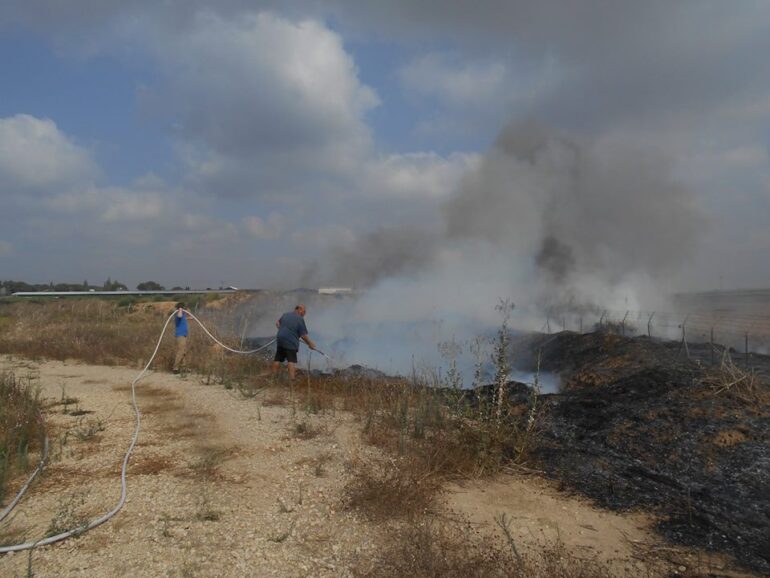I made Aliyah five years ago and spent my first three and a half years in the country on Kibbutz Alumim, a small dati kibbutz in the western Negev. I love it there. Even though I’ve been living in Jerusalem for a year and a half now, I still consider the kibbutz my home and the people there my first “family” in Israel.
I visited the kibbutz this past weekend and I spent a large chunk of my time running to shelters and waiting for the “boom” to notify me when I could emerge safely. You see, Alumim is four kilometers from the Gaza border, and we basically have about 10-15 seconds to get to a shelter from when we first hear the lady’s voice calmly saying “Tzeva Adom.”
After my first five or so alarms, I stopped counting. I got used to running to shelters during Operation Protective Edge, so it wasn’t new for me (I can’t say the same for the guest I brought with me), and I would even say it was a bit fascinating to see the Iron Dome in action, even if the noise is terrifying. That being said, the situation isn’t healthy – young children with PTSD, people unable to go about their lives normally, the Israeli government not really doing much to help (the ruling class doesn’t care much about the geographical, socio-economic, or socio-cultural peripheries). No one seems to understand why their neighbors try to kill them and then cry “foul play” when we fight back. Something needs to change.
I started university eight years ago and through my on-campus activism began to (slowly) learn more about the Palestinian narrative. I now work with several Palestinian activists and hear horror stories about what goes on in Gaza. Heavily rationed water, when Israel is number one in the world when it comes to desalination. Electricity being cut off randomly, when living in the 21st century means your whole life depends on electricity. Rationed food. No freedom of movement. War every couple years, with relatively high death tolls and no way to escape. They don’t have any way to improve their quality of life and many of them feel that their only recourse is violence.
The situation isn’t healthy – young children with PTSD, people unable to go about their lives normally, the Hamas government not really doing much to help (their rulers don’t seem to care much about anything other than beating Israel). No one seems to understand why their neighbors won’t just leave them alone and stop making their lives a living hell. Something needs to change.
Who’s to blame for this situation? I’m going to say something that’s pretty unacceptable in some of my circles, but I think it’s true. The answer, at least for the most part, is Israel. WE were the ones who elected leaders who weren’t strong enough to resist pressure from Washington. WE were the ones to give away our land, and with it the responsibility for the lives of the people living there. WE were the ones to rip our brothers and sisters out of their homes in Gush Katif, where they lived in relative peace and prosperity with their Palestinian neighbors (although those relationships were already ruined by the Oslo process). WE are the ones who are still stuck with an “everyone is anti-Semitic and just wants to kill Jews for no reason” victim mentality (which is true for certain demographics, but not most Gazans). WE are the ones who adopted Western colonialist practices that aren’t in line with Jewish values in the name of “security” – and a whole lot of good that “security” is doing us. WE are the ones who know deep down it was a mistake that needs to be reversed but are too afraid of how the international community might react.
Yes, Hamas is sending rockets and putting up human shields. Yes, the United States coerced us into giving away Gaza in the first place. Yes, the international community provokes the conflict by taking sides on the world stage and funding everyone. But we, the Jewish people that claims to be a light unto the nations, WE have to stop passing the blame. We don’t have any rights here. We have responsibilities. We have a responsibility to the land and the people living on it that we’ve been shirking since even before 1994.
This situation is so dire that words can’t do it justice. No one should have to live the way people in Gaza and the western Negev are living. We have to understand that things aren’t going to be better for anyone until they’re better for everyone, and it’s OUR job to make them better.





